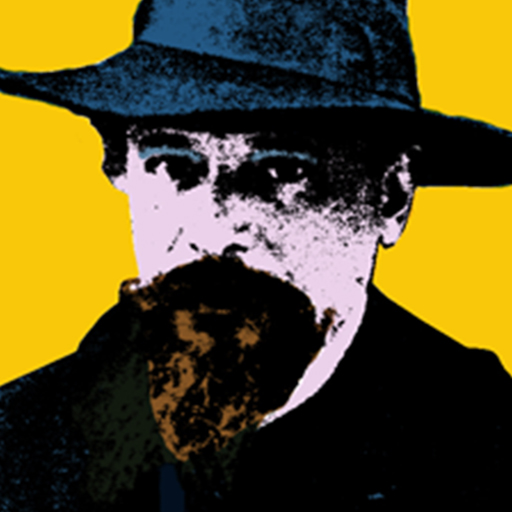Theodor Lessing
Age: 152.
Appearance: ZZ Top without the guitars.
Some autobiography please: Born in Hanover, Germany, where he lived most of his life from 1872 to 1933. He was shot dead by two nazi contract killers in his exile in Marienbad.
Oh, I know him. We read him at school, Nathan the wise, the like. This is not Gotthold Ephraim Lessing. But jewish families adopted the name Lessing to show their thankfulness and gratitude for the lonely fighter for enlightenment during the eighteenth century. This is Theodor Lessing, the philosopher and psychologist and excellent writer of memorable aphorisms.
Never heard of him: He might soon be one of the most popular philosophers of our present time.
Let me guess, he’s making a comeback? Sort of. But he has always been around. People can’t remember everything, they forget, and then they remember. Otherwise you would soon go mad.
Could you sum up his philosophy, like, in two words? Nice try.
Why is his philosophy remarkable: He’s readable, which is very rare for a philosopher writing in german. Better still, he’s highly entertaining. And, of course, as a real philosopher, he thinks deep and thoroughly.
So move over Heidegger, here comes… Well, yes, in a way, but we are definitely not in a sports arena.
How does he describes himself? »I always felt like a revolutionary, always thinking againts the current. I always hated the selfcomplacent ›bourgeois‹, I always loved the suffering people.«
So what is it about his philosophy that people find so provocative? Telling people the truth generally drives them up against the wall.
Let’s start with the books. Any I might have heard of? History as sensemaking of the senseless; Europe and Asia; Flowers; Demons; My animals.
Animals pretty much take the mystery out of everything. Do you mind? I do the jokes.
Bitchiest remark: »Five illegitime children from five valuable contemporarians is more ethical than having only one child whose father is a regierungsrat.«
Come again? Well, you’ve asked for it: »We are all wild beasts covered in culture.«
Very nice. A bit of a rebel then? »It was always natural for me to take the part of the underdog.«
Is he on the internet? A website called theodorlessingedition.de was created by his editor in 2014. In fact you are actually on this site right now. (Welcome!) There you can find plenty of information about his life and his books, which will provide you with a daily dosis of his philosophy. Small portions for the ADDA.
You mean ABBA! Well, no, it’s attention deficit disorder age.
Sometimes I like it big and heavy. In this case you should check out his books, which you can find at your local library. See at www.worldcat.org If you like to own his books, you can buy them, the latest is called ›Kultur und Nerven‹ (Göttingen 2021, 2 Bde., Wallstein Verlag).
Most famous lines: »According to Plato philosophers should be the leaders of the people. As a philosopher Hindenburg would not be climbing the throne, just a representative symbol, a question mark, a zero. You could say: better a zero than a Nero. Unfortunately history shows that behind a zero there will always be hiding a future Nero.« Hindenburg. (Prager Tagblatt, 04/25/1925).
Clearly a man ahead of his time. There is more: »The center of every storm is an empty naught. Hitler may be the void, but he points to the storm.« Published on the nineteenth of June, 1932. On January, the 30th, the following year, Hitler became Reichskanzler.
Dress sense: Hat, beard, walking stick: a distinguished gentleman. And he’s a mobile monument.
I’m sorry, what did you just said? Made from a foto, it has an integrated QR-Code for your smart phone and the editor wanted it to be distributed in Hanover, Germany, Lessings hometown. But the city officials of Hanover and the heads of cultural institutions refused to put the mobile monument up in their rooms.
What do students of philosophy think? In 2006 a group of students wanted to name the university of Hanover Theodor-Lessing-University, but eventually it was named after Gottfried Wilhelm Leibniz. It is a much bigger brand. We live in an age of global marketing. Remembering one of the first victims of the Nazi regime is not a good business decision.
You are so last century! Well, Leibniz is seventeenth century, so there is no danger of getting into nazi politics at all.
Hostile obituary: »This disgusting Lessing shared the mind of his murderers. I am scared of such an end, not because it will be the end but because it is so pathetic and it may suit a Lessing, but not me.« Thomas Mann in his diary.
Who would he want to be in another life? A cloud without the ›i‹. »While I was laying in the grass my best companions were clouds, doing nothing else but watching them. When I saw the fabulous mountains of clouds, the colours and edges, the sad reality disappeared into nothing.«
Least likely joke to make: He’s jewish. Be prepared for lots of them.
Do say: Who says philosophy is only written for professional philosophers?
Don’t say: Too long, didn’t read.
Der Dialog ist eine der ältesten Formen der philosophischen Erörterung. Die Werke Platons sind durchgängig in dieser Form überliefert. Die englische Zeitung ›The Guardian‹ hat in den neunziger Jahren des 20. Jahrhundert diese Form als regelmäßige Kolumne unter dem Titel ›Pass Notes‹ wiederbelebt, als satirische Belustigung über Alltagsphänomene verschiedener Art. Mein satirischer Dialog über Theodor Lessing ist von dieser wundervollen Rubrik inspiriert worden. Rainer Marwedel
